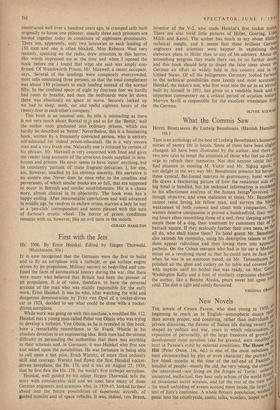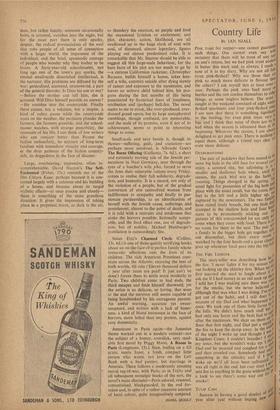New Novels
THE novels of Cesare Pavese, who died young in 1950. °f, beginning to reach us in English—atmospheric essays 1 oy
A
than novels proper, and conjuring, rather than individuals at; private dilemmas, the flavour of Italian life during twenty 10" shaped by politics and war, years in which relationships, expansion of personality, all the large freedoms of growth ar- development most novelists take for granted, were modified least in Pavese's. eyes) by external conditions. The House on the Hill (Peter Owen, 14s. 6d.) is one of the most nebulous,of least circumscribed by plot or even character; the portrait A few bleak months at the time of the tail-end of Fasets01' g handful of people—mostly the old, the very young, the cow-ar ' c the uninvolved —are living on the fringes of Turin : untiere uncentred, ineffectual, they hear only echoes of the world t111%, h
at'
an occasional secret wireless, and for the rest of the time 0 the small unfolding of events around them inside the larger ,,d bt text of Italy's confusion. A whole flotsam population, washed' panic into the countryside, meets, talks, wonders, hopes nov' then, but rather faintly; someone occasionally bolts, is arrested, vanishes into the night, but for the most part there is only apathy, despair, the radical provincialism of the soul that robs people of all sense of connection with a larger world, the impotence of the individual, and the brief, spasmodic courage of people who wonder why they bother to be brave. A forty-year-old schoolmaster, not long ago one of the town's gay sparks, the eternal small-scale dissatisfied intellectual, is the narrator. His problems are diffused by the war: generalised, scattered, unanswered, a part of the general disorder. Is Dino his son or not? —Before the mother can tell him, she is arrested. Will Dino himself provide an answer? —He vanishes into the countryside. Finally there' comes, not a solution, but a respite, a kind of sultry pause while the countryside waits on the weather, the partisans plunder the farmers, the farmers grumble, and the school- master watches, with strange immobility, the remnants of his life. I can think of few writers who can conjure better than Pavese the Italian melancholy, its mixture of long-term fatalism with immediate vivacity and courage, or the dopy patience of the Italian country- side, its doggedness,in the face of disaster.
Large, overbearing, impressive, often in- comprehensible, David Stacton's The Self- Enchanted (Faber, I5s.) reminds me of the film Citizen Kane, perhaps because it is con- cerned largely with a colossus and his building of a house, and because about its turgid stylistic effects—at once precise and cloudy— there is something of the same grandiose direction. It gives the impression of taking place in a perpetual storm, so dark is the air, so thundery the emotion, so purple and livid the occasional lyricism or excitement; and plot, character, action, likelihood, are all swallowed up in the huge clash of soul with soul, of distanced, almost legendary, figures playing out almost predestined roles. It is remarkable that Mr. Stacton should be able to suggest all this large-scale behaviour, for the bare facts of his plot are not much to go by —a curious Californian racketeer, Christopher Baracco, builds himself a house, takes him- self a wife, commits suicide after dying slowly of cancer and exposure to the mountains, and leaves an unborn child behind him, his pro- gress during the last months of life being punctuated by hysterical fears of loneliness, retribution and (perhaps) hell-fire. The novel seems to me to creak, like over-produced, over- dressed grand opera, but its large metaphysical rumblings, though confused, are memorable, and the scale of its promise, even if not of its achievement, seems to point to interesting things to come.
Small-scale and neat beside it, though its themes—suffering, guilt, and expiation—are perhaps more universal, is Albrecht Goes's The Burnt Offering (Gollanez, 7s. 6d.), a short and extremely moving tale of the Jewish per- secutions in Nazi Germany, seen through the eyes of a butcher's wife who, forced to serve the Jews their miserable rations every Friday, comes to realise their full solidarity, degrada- tion, and humanity. It is a record, not only of the violation of a people, but of the gradual conversion of one uninvolved woman from indifference to sympathy and finally to pas- sionate partisanship, to an identification of herself with the Jewish cause, sufferings, and punishment, almost to the point of death; and , it is told with a restraint and tenderness that make the horrors possible, fictionally accept- able, and the final effect one, not of degrada- tion, but of nobility. Michael Hamburger's translation is outstandingly fine.
Susan Ertz's Charmed Circle (Collins, 13s. 6d.) is one of those quietly terrifying books about an on-the-face-of-it perfect family whose tentacular affections ruin the lives of its children. The rich American. Prentisses com- mute across the Atlantic, enjoying the best of both worlds, till ruin ('Eleven thousand dollars a year after taxes are paid! It just can't be done') forces them to settle more modestly in Paris. Two children come to bad ends, the third escapes and finds himself disowned; yet the satire is so delicate, so loving, that even at the end the survivor still seems capable of being hoodwinked by his outrageous parents. An awful warning, accurate yet sweet- tempered, and written with a lack of bitter- ness, a kind of bland innocence in the face of horrors, more lethal than any protest, against cosy domesticity.
Americans in Paris again—the Jamesian theme worked out in a modern context—are the subject of a breezy, overslick, very read- able first novel by Peggy Mann, A Room In Paris (Longmans, I5s.). Stan, loafing on a GI grant, meets Janet, a fresh, compact little person who wants, not love on the Left Bank with a bad painter, but marriage in America. There follows a moderately amusing moral tug-of-war, with Paris, as in Trilby and all subsequent nostalgic books of the sort, the novel's main character—Paris adored, resented. romanticised, blackguarded, in the end for- saken and, in spite of a rather excessive amount of local colour, quite imaginatively conjured.
ISABEL QUIGLY



































 Previous page
Previous page